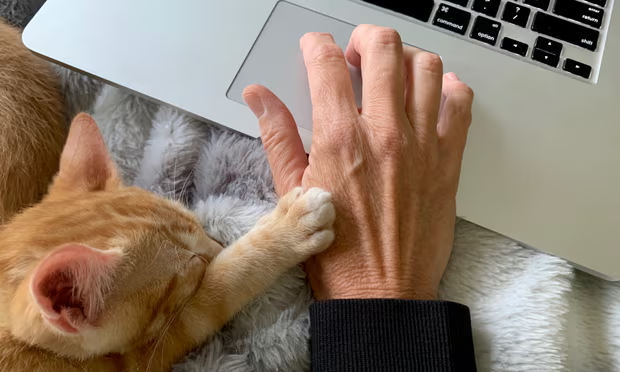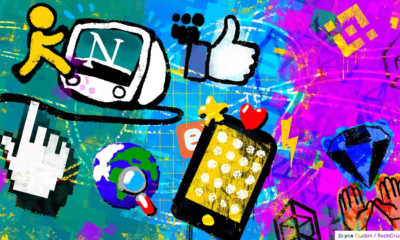Internet
Banning kids from social media isn’t the way – it’s the over-60s who need to get off the internet

Nobody is immune to the perils of social media, but digital brainrot is hitting over-65s particularly hard. Let’s look at the symptoms
Cocomelon-grade shockwaves have rippled through the gen alpha community and vocal-fried gasps can be heard from the younger gen Zs. Digital natives – individuals who grew up in a world where technology and social media were as ubiquitous as air – have been informed that the NSW government is proposing a social media ban on users under 16 years old, restricting access to apps such as Tiktok and Instagram.
This ban, endorsed by Anthony Albanese, is backed up by the World Health Organisation’s declaration that “brainrot” is the greatest health issue facing children between ages 10 to 16 since Covid, with a 45% increase in diagnoses since 2019. In younger people, we’re told, it can manifest as an inability to sustain focus, talking back to adults and general self-concept issues.
“It can be devastating,” Albanese said about the impacts of social media on confidence. “I don’t look at the comments on my social media because, if I did, I’d find it difficult to leave the house in the morning. People will say things anonymously that are terrible.”
Maybe it’s time to start looking at the comments Albo, and not just wait for election polls.
He is right, though: social media is indeed terrible for your mental health – and your brain. But its impacts are not just endemic among young adults and children. In fact, a 2023 study by the European Centre for Disease Prevention and Control (ECDC) found that due to exposure to misinformation brainrot has eclipsed dementia and Alzheimer’s as the most prevalent condition among individuals aged 60-95.
So are we right to ban under-16s from social media? Instead, I propose a more revolutionary idea: ban the over-60s.
Of course, no age group is immune to the perils of social media, but I firmly believe that grandads should have green thumbs, not scrolling ones. Let’s take a look at the symptoms of brainrot that affects these pensioners.
Misinformatitis
The first symptom, which I will call misinformatitis, is a significant challenge for older generations in our increasingly digital world. Just the other week, my aunt showed me a picture of Oprah opening a hospital in Somalia after her recent marriage to a Somali politician. The picture was AI-generated – but to her, the image looked real.
For me, the giveaway was the eight fingers on Oprah’s left hand. However, to my geriatric aunt and her peers, the comments were flooded with “Pray you get well soon” and “Come to the hospital you opened up”.
my grandma keep sending me AI generated images she finds on facebook and she’s absolutely convinced they’re real. i don’t have the heart to tell her that they’re fake but AAAAAAAAHHHHHH pic.twitter.com/KDTqmivGTM
— Riley (@beefnoodlesoups) July 20, 2023
The internet, designed to be a fountain of knowledge, becomes a breeding ground for misguided beliefs. Would banning non-natives help reduce the risk? We can only hope.
Overshareiosis
Overshareiosis manifests in three stages, with symptoms gradually appearing until all are evident. The initial symptom is the compulsive over-sharing of thoughts and feelings. Every meal, every minor ailment, and every opinion gets broadcasted to their entire social network.
On social media, older generations utilise the comments section as their personal DMs. Overshareiosis impairs the part of the brain responsible for recognising that comments are publicly available
Omg somebody please teach Barbra Streisand how to send a DM pic.twitter.com/js6gqdMLUv
— Robert Komaniecki (@Komaniecki_R) April 30, 2024
Dubbed “supersharers”, those suffering from the third symptom of oversharioisis transforms page of the elderly into cluttered bulletin boards filled with dubious links and questionable “health hacks”. Scanning through your grandmother’s Facebook in search of photos from your graduation becomes a task of sifting through 42 methods of interpreting the colour of your urine and an unconventional “cure” involving the feathers of an ibis.
Discernemia
Another troubling condition afflicting our seniors is discernemia, which manifests as an inability to discern and verify information online. Older users, unfamiliar with the mechanics of algorithmic filtering and the profit motives behind social media models, often take the frequency of posts as validation of their truth.
This is how we end up with entire nursing homes discussing the Royal family’s supposed 70% reptilian DNA based on a post with 100,000 likes that shows Prince Charles’ supposed forked tongue. RIP Princess Diana, you were the “People’s Princess” because “people” are warm-blooded.
The LIZARD ILLUMINATI…The Royal Family are Reptiles from another Planet…GOOD Old David Icke at his Best… Quote"The're Reptiles.I'm not kidding.They're Inhumane"(Princess Diana) pic.twitter.com/4eDdHn3dJk
— Bob Liddell (@pr_liddell) September 3, 2023
This failure to navigate the digital landscape leaves older adults vulnerable to political propaganda and conspiracy theories. Their timelines, filled with like-minded posts, create echo chambers that distort reality.
Meanwhile, younger generations, aware of how their data is used to manipulate their feed, remain skeptical and discerning.
Virtual Yelling
Hey grandma, ease it on the CAPS. I’m sensitive.
In light of the challenges posed by misinformatitis, overshareiosis and discernemia amongst older generations, implementing a social media ban for individuals over 60 emerges as a potential solution to mitigate the risks of online harm and exploitation.
If you yourself felt the content of this article to be an accurate assessment for the reality of social media’s impacts on the aging mind, subscribe for more similar content by clicking on this link.
(If you clicked on this link you probably need to be banned from the internet.)







